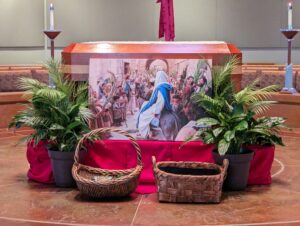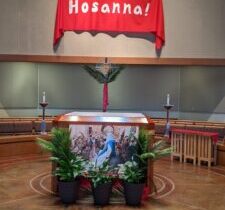Hosanna – Please Save Us
 It’s funny how we can live for many years and hear a word over and over without really knowing what it originally meant. I discovered this yet again as I was looking over the readings for Palm Sunday. Words in scripture have very specific meanings that sometimes differ from our usage of them today. We repeat them day after day, week after week, year after year. And what we may think we are saying is not necessarily what the original words meant to those who first said them.
It’s funny how we can live for many years and hear a word over and over without really knowing what it originally meant. I discovered this yet again as I was looking over the readings for Palm Sunday. Words in scripture have very specific meanings that sometimes differ from our usage of them today. We repeat them day after day, week after week, year after year. And what we may think we are saying is not necessarily what the original words meant to those who first said them.
Hosanna is one of those words. In a Christian context, it has come to mean praise, adoration, joy. As a noun, it refers to these same feelings. Words of praise for a wonderful musical performance can be described as hosannas, for example.
Yet the original definition of the word is different. In Hebrew, hosanna is a word that means “save us, please,” or “help.” It is used in prayer as part of the liturgy for Sukkot, the Feast of Booths or Tabernacles.
On Palm Sunday, we enter into Holy Week, the culmination of our Lenten Journey. We begin our “deep dive” into the mystery of Jesus’ Passion, Death, and Resurrection.
It all started with a ride on a colt – a young donkey or horse. One that had never before been ridden. It was Passover time and Jerusalem was full of people who had come to town to celebrate the great feast. It was rather like the crowds that gather in Rome for Easter in our times. Jesus was also planning to celebrate Passover in Jerusalem. He had arrived with his followers at the home of friends in a nearby town.
As he typically did, he planned to go into the city. But this time he did not plan to slip quietly into town to pray. All four Gospels tell of this day. He sent his disciples into town to find a colt on which he would ride. They put cloaks on the colt and Jesus rode on it. When people saw him coming, or heard that he was coming, they raced out to see the sight.
Now, this was somewhat like the entry of a conquering hero, a military leader, except he wasn’t mounted on a great war horse, he was quietly riding a colt. The prophet Zechariah had said that the king, the savior, would come mounted on a colt. People came out to see him coming. They put cloaks across the road and waved tree branches, palm branches, in his honor, just as had happened in ancient times with the arrival of a king.
And what did the crowds of people cry out? “Hosanna! Blessed is he who comes in the name of the Lord!” In essence they were saying: Help us, you who are coming in the name – the authority and power – of the Lord, our God, true King of Israel! (Mk 11:1-10 or Jn 12:12-16))
That’s pretty powerful stuff.
Most of the folks calling out for Jesus to help them expected that he would be a military hero who could defeat the Romans and restore the Kingdom of Israel. The Messiah, the Anointed One, was expected to do that. But that was not to be. It was not the way the Lord works.
The readings continue the story for us. Jesus entered the city. He continued teaching and interacting with the authorities. But that’s not what we hear in the readings this day. Today we hear of the sufferings of a Servant of the Lord whose words were not welcomed by those in power. This person whose cry we hear holds fast to hope in the Lord. “The Lord God is my help, therefore I am not disgraced; I have set my face like flint, knowing that I shall not be put to shame.” (Is 50:4-7)
We hear the prayer in Psalm 22 of another who suffered greatly for faithfulness to the Lord’s call. “My God, my God, why have you abandoned me?” Jesus himself prayed this prayer as he hung dying on the cross. It sounds hopeless, until you come to its magnificently hopeful and glorious end. “I will proclaim your name to my brethren; in the midst of the assembly I will praise you … Give glory to him; revere him all you descendants of Israel!”
Another hymn reminds the Philippians and all of us that Jesus, the Christ, did not choose to remain aloof from us as God but rather became one of us. He lived a totally human life and suffered a tortured, disgraced death. Yet in entering so deeply into human life and suffering, without returning evil for evil, he transformed it for all of us. (Phil 2:6-11)
Finally, we hear the story of Jesus’ last few days. We learn of the plots against him. We hear of the gift of anointing given him by a woman who visited the home of his friends in Bethany. We shake our heads at the actions of Judas Iscariot, who agreed to hand over his friend to the authorities. And then we hear of that Last Supper in which Jesus gave us the bread and wine of the New Covenant, one that would not require animal sacrifice. (Mk 14:1-15:47)
As we listen to these words and enter once again into the mystery, may we take time to ponder the lessons of these stories.
The people there and we here today pray: Hosanna – Help us, please save us, You who come in the Name of the Lord.
We all need help on our journey. Jesus opened the door to reconciliation with our Father. He also helps us along the way.
Readings for Palm Sunday of the Lord’s Passion
Read More

















